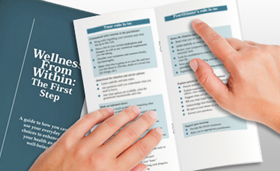Search Results
Dietary Choices and Listening to Your Body: Part B

Marcey Shapiro, MD
You can learn to listen to your body, because your body is wise. It knows what it needs and wants. This is an opportunity for further self-exploration. The more you are able to tune in to your body, the less the question of what you “should” eat will occupy your conscious thought.
You might begin by examining any preconceived notions. Do you have beliefs about what is healthy for you? About what you should eat? About what is a more “spiritual” way to eat? About what is a more “healthy” way to eat? Where do these beliefs come from? Do you feel healthy? Do you feel spiritually connected? Do you feel vibrant? If not, do you recall feeling strong and fit in your life? When was that? What was your life like then?
This simple technique works well for many people who want to feel more in harmony with what they eat. The key is to ask, and then to listen for the answer. The body can respond in a variety of ways. You might feel something physically, like comfort or discomfort, or experience an emotion such as well-being or disgust. If you are someone whose tension manifests in the digestive tract, a food that is good for you in the moment will feel good emotionally. It will feel comfortable in your stomach when you think of it, while a food or nutritional supplement that is not right for you might cause a cramp, an “off” feeling, or a slight tensing. The more you practice this awareness, the easier it becomes to notice subtle cues. Another advantage of this practice is improved self- awareness. With greater attention to one’s body/mind/spirit connection, emotionally related physical symptoms can diminish and even disappear through listening to one’s inner wisdom.
When you are interested in a particular food but are not certain it is right for you, simply ask your body. You might start with breathing between your heart and an area of concern. This can be a specific area of the body or just a general query. For example, if you have joint stiffness, think of or hold a particular food that you are wondering about and feel for it in your joints, breathing between your heart and your joints. Ask your joints, will this food nourish and support you at this time?
Consulting just the mouth or taste buds can, unfortunately, be unreliable. Our whole self is sometimes not in alignment with something our taste buds find appealing. One reason our mouth and taste buds can be out of sync with our overall well-being has to do with our thoughts. Our taste buds can be influenced by culture, beliefs, and peer pressure, overriding our inner wisdom. We might associate the taste of a particular food with comfort, or relief, or happiness, even if it does not provide nourishment to the body. For many, the mouth’s desires for sweets, in particular, has associations with soothing that do not apply to the rest of the body/mind/ spirit. Bringing the mouth and taste buds into alignment involves finding other healthful ways to soothe the emotions so that better overall alignment can be achieved.
Excerpted from Freedom From Anxiety: A Holistic Approach to Emotional Well Being by Marcey Shapiro, MD, published by North Atlantic Books 1/14/14 , copyright © 2014 by Marcey Shapiro. Reprinted by permission of publisher.
Stay tuned for more thoughts from Marcey Shapiro, MD, on “Transforming Health” and Heart Centered Living




















